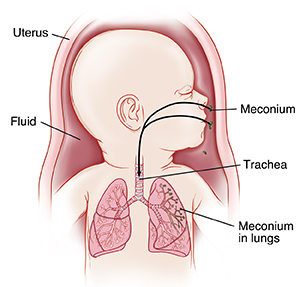Meconium Aspiration Syndrome in the Newborn
Meconium is the sticky stool in the intestine at birth. When it gets into the baby’s lungs, the airways (bronchial tubes) inside the lungs become swollen (inflamed). This makes breathing harder. Meconium can also get stuck inside the air sacs (alveoli) at the ends of the airways. This makes it harder for the baby to get enough oxygen. Meconium in the airways may also prevent air from leaving the lungs. This can cause the lungs to fill with too much air (overinflate) and lead to problems, such as a collapsed lung (pneumothorax).

How is it treated?
Mild cases may not need treatment. In more severe cases, breathing support is needed. This could include:
-
Supplemental oxygen . It may be provided through soft tubes inserted into the baby’s nostrils (cannulas) or through a plastic hood placed over the baby’s head.
-
CPAP (continuous positive airway pressure). This machine provides continuous air flow into the baby’s airways. It helps hold open the airways and clear fluid. The air is blown through a mask that goes over the baby’s nose or through cannulas. CPAP may be used with or without supplemental oxygen.
-
A ventilator. This machine helps the baby breathe by sending air directly into the lungs through an endotracheal tube (ETT). An ETT is inserted through the mouth or nose and into the windpipe.
-
Nitric oxide. This special gas makes the blood vessels in the lungs become larger or wider. This increases blood flow to the lungs and makes it easier for the baby to get oxygen. Nitric oxide is given to the baby on a ventilator.
-
A lung-bypass machine known as ECMO (extracorporeal membrane oxygenation). This machine does all the work for the baby’s lungs until the lungs heal.
- Medicines. Antibiotics are often given to treat infection. Surfactant is a substance that is distributed directly into the lungs. It increases the surface area available for gas exchange. This is used for babies on ventilators with high oxygen needs.
What are the long-term effects?
How your baby does will depend on how severe the syndrome is. Some babies recover completely, with no lasting effects. Others may take a long time to recover and have lasting lung damage. If the baby goes without oxygen for too long, this can lead to problems in other parts of the body. Talk with the healthcare provider about how your baby is likely to progress.